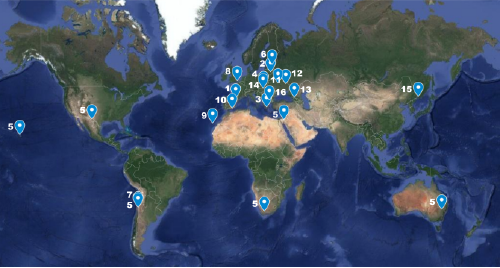The Europlanet Telescope Network: A global collaboration in support of planetary sciences
- 1Space Research Institute, Austrian Academy of Sciences, Graz, Austria (manuel.scherf@oeaw.ac.at)
- 2School of Physics & Astronomy, University of Edinburgh, Edinburgh, UK
- 3Escuela de Ingeniería de Bilbao, University of the Basque Country (UPV/EHU), Bilbao, Spain
- 4University of Vilnius, Vilnius, Lithuania
- 5Adam Mickiewicz University, Poznan, Poland
- 6Observatoire de Paris, IMCCE, Paris, France
Planetary sciences is an exciting part of astronomy, and even though space missions are nowadays providing high-quality data from remote and in-situ measurements of the planets, asteroids and comets, ground-based observations are still yielding exciting results by providing crucial data sets for a better understanding of the diverse bodies in the Solar System. The discovery of thousands of exoplanetary systems during the last few decades further enhances the need for ground-based observations, collaboration between small telescope facilities and for strengthening the contribution of amateur astronomers to planetary sciences.
Access to the Europlanet Telescope Network
As part of the recently launched Europlanet 2024 Research Infrastructure (EPN 2024 RI; https://bit.ly/2Z1XA8u), a new collaboration between telescopes around the world has been started for providing coordinated observations and rapid responses in support of space missions and in following-up of new events. The so-called Europlanet Telescope Network (https://bit.ly/37SCiyj) will thereby provide professional scientists and amateur astronomers with access to an initial set of 16 telescope facilities (see Fig. 1) up to 2 m in diameter. While the network plans to draw in additional facilities and to build new collaborations, particularly in regions that are currently under-represented in planetary sciences, scientists and amateurs can now apply to visit those facilities that are already participating in the network and have their expenses reimbursed for the time needed to make their observations. This also comprises the possibility of remote observations since the network includes some robotic or remotely operated facilities. The Call for Observations (see website: https://bit.ly/2Br5LDt) runs from June 2020 until the end of 2023, and is coordinated through EPN 2024 RI, which is funded by the European Commission’s Horizon 2020 program.

Fig. 1: The Europlanet Telescope Network (see also Section The Telescopes).
Supporting Amateur Astronomers
Besides fostering collaboration and providing access to small telescope facilities, the Europlanet Telescope Network also plans to support the integration of amateur astronomers into planetary sciences, since their observations can be of crucial importance for several scientific areas. Planetary atmospheres, for instance, is a field that benefits intensively from amateur astronomers. Their regular observations at high-spatial resolution are used by researchers to perform detailed studies of the atmosphere dynamics of Jupiter and Saturn and surveys of atmospheric activity on Neptune. They also provide excellent coverage of dust storms on Mars and complementary observations of Venus to space missions that observe over different viewing geometries. The accumulated observing time provided by amateurs makes it likely that unexpected events (such as convective storms on Jupiter and Saturn; impacts on Jupiter) are discovered by amateurs faster than by orbiting spacecraft or regular ground-based observation programs. Many amateurs supply their data to public data repositories that cover multiple planets like ALPO-Japan (http://alpo-j.sakura.ne.jp) or PVOL (http://pvol2.ehu.es/pvol2) on a daily basis, resulting in extremely fast follow-ups of interesting events. Space missions like NASA’s Juno keep excellent interactions with amateur astronomers that provide a large amount of observations to the mission through a dedicated website (https://www.missionjuno.swri.edu/junocam) used by Juno’s scientists to target some of their high-resolution observations.
Advanced asteroid studies by using the GaiaGOSA web service (gaiagosa.eu) is another important example on how amateur observers can help planetary scientists. The photometric observations of asteroids provided by amateurs are essential for the determination of rotation periods. Data gathered from a few oppositions allow to determine detailed physical parameters that are crucial for determining the nature of these particular objects such as spin axis orientation, shape, and size, but also for verifying our understanding of the history of the Solar System. Recently, the data gathered by amateur observers helped to determine more precise shapes and volumes of 13 asteroids (Podlewska-Gaca et al., 2020, A&A, id.A11; see also Fig. 2) and to reveal the true nature of asteroid (10) Hygiea, which turned out to be a perfect candidate for a dwarf planet rather than an asteroid (Vernazza et al., 2020, Nature Astr., 136-141).
Fig. 2: The shape of (68) Leto asteroid determined with help of GaiaGOSA observers.
The Telescopes (Fig. 1):
Further information available at https://bit.ly/2Br5LDt.
Acknowledgements:
Europlanet 2024 RI has received funding from the European Union’s Horizon 2020 research and innovation programme under grant agreement No 871149.
How to cite: Scherf, M., Snodgrass, C., Hueso, R., Tautvaisiene, G., Podlewska-Gaca, E., Colas, F., Sanchez-Lavega, A., Garate-Lopez, I., Dudziński, G., Bartczak, P., and Kargl, G.: The Europlanet Telescope Network: A global collaboration in support of planetary sciences, Europlanet Science Congress 2020, online, 21 Sep–9 Oct 2020, EPSC2020-313, https://doi.org/10.5194/epsc2020-313, 2020.

